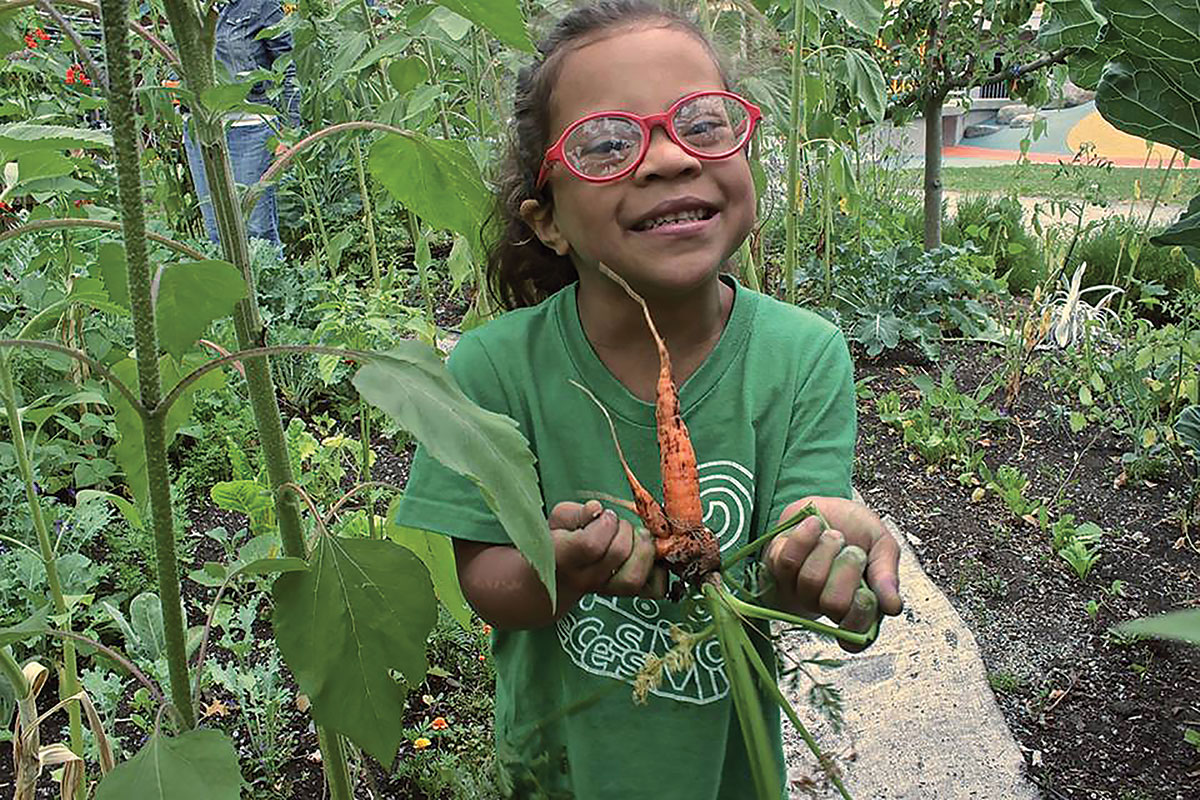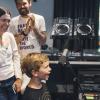
As Adana Protonentis watched her son Langston gradually lose his speech and eye contact at age 2, she did what any parent of a child diagnosed with regressive autism would do. She sought urgent support in many areas, from early-intervention therapies to developmental preschool. Some techniques helped and others stalled, but the magic happened in just one place — the great outdoors.
“It was like he was unlocked when he was outside,” explained Protonentis. “Inside he was quiet, but outside at the park, he would babble.” So his speech therapist suggested moving the sessions outside to a park. “In six months, Langston was speaking whole sentences.”
Now, Protonentis sees the benefit of nature-based play for kids with special needs every day in her work as administrator at Seattle Children’s PlayGarden, a nationally acclaimed play space that has pioneered therapeutic play in the outdoors.
The seeds for the PlayGarden were planted in 2002, when speech pathologist Liz Bullard learned of a new outdoor facility for children at New York University’s Rusk Institute for Rehabilitation Medicine that challenged traditional strategies by taking its therapy outdoors. Bullard dreamed of building such a space in Seattle, one that would be accessible to kids of all abilities, incorporating unstructured play in nature to facilitate physical, social and cognitive development. She raised private funds to turn her dream into reality, incorporated the PlayGarden as a nonprofit and signed a lease in 2004 to create the space on an undeveloped acre of land adjacent to Colman Playfield in Seattle’s Rainier Valley. With Bullard serving as executive director, the PlayGarden opened its gates for its first season of inclusive summer camp in 2006.

Accessible swings: Just the beginning
I opened those same gates recently when I stopped at the PlayGarden to explore its facilities and naturescapes with my son Isaac, who is on the autism spectrum. I was careful to set the latch firmly behind me as we entered. The secure, outdoor environment is a key feature of the PlayGarden, so that children, especially those with a tendency to wander, can feel free to explore without restraint and stay safe at the same time.
On the day that we visited, after ogling the already mammoth-size pumpkins and towering sunflowers in the organic veggie garden, Isaac made a beeline for the adaptable playground equipment and chose to settle into a large yellow support swing, designed for kids who need extra physical or motor support. Many Seattle playgrounds have these yellow swing sets, but unfortunately, that’s often where inclusion and accessibility end. At the PlayGarden, it’s only the beginning.

The range of opportunities for kids of all abilities to explore, take risks, play and be creative is extraordinary. Anchoring the site is a multihued, spongy volcano known as Mt. Jordan, the summit accessible by both foot and wheel. A water rill flows down one side of the peak, feeding a wheelchair-accessible splash table. A musical art sculpture — created by celebrated artist Trimpin — doubles as a fence so it can be played from both sides. Beside the modern, grass-roofed Garden House, an assortment of ducks, geese and chickens occupy a large coop (the fluffy rabbits make good snuggling companions for a child in need of sensory comfort). Down a shady path is the garden’s Wild Zone, where huge conifers, switchback trails and a wheelchair-accessible tree fort/pirate ship promote even more adventurous play.
Hungry? Pop a juicy strawberry or crunchy pea in your mouth. At the PlayGarden, foraging is encouraged, all plants are edible or nontoxic and whimsy is part of the design: Parked in a sun-dappled corner, for example, is an old red pickup truck whose front engine and flatbed have been upcycled into edible berry planters.
In the indoor kitchen, kids can safely explore the connection between garden and table; the cooktop stays cool in case of contact with small fingers.

‘Overcoming challenges together’
Each component of the PlayGarden’s natural landscape “rooms,” play structures and indoor facilities are designed for kids with special needs in mind, including physical disabilities, vision and hearing impairments, autism, attention deficit hyperactivity disorder (ADHD), cerebral palsy and Down syndrome. Paved pathways and accessible ramps connect each area, allowing children to move freely around the garden spaces.
Interactive art is sprinkled throughout the PlayGarden, fostering imaginative, shared play. This was a key part of the design team’s vision, a collaboration that included therapeutic gardening expert Daniel Winterbottom and sustainable-garden designer Wendy Welch. We spotted bright green shrubs carved into the shapes of dinosaurs, a sculpted pig waiting for a head pat and an ivy topiary in the shape of a necktie-wearing man riding a bicycle.
“Look at this silly guy!” Isaac happily yelled during our visit, gesturing to come and share in his experience.
As for impact? The PlayGarden and its founder have won acclaim and awards. (Most recently, Bullard was awarded a 2015 Great American Gardeners Award from the American Horticultural Society.) But more importantly, stories of how it’s changed lives are all over Seattle.
Just one example: Back in 2006 when the PlayGarden launched its inaugural summer camp for kids with disabilities, a 4-year-old boy with autism named Maxwell* strolled through the gates with his mother beside him. He was a bundle of anxiety. A few days later, Maxwell was drawing and painting, and then playing in the mud and digging for earthworms. He returned the next summer, and every summer after that. He now spends two weeks each summer as a junior camp counselor at the PlayGarden, honing leadership skills he didn’t even know he had.
“I like working with the younger kids and feeling like I’m making a difference in their lives,” said Maxwell, now age 13. “The people there just really want to help kids. It’s a great place to overcome challenges together.”
*Maxwell’s name has been changed to protect his identity.
Visit Playgarden:
Seattle Children’s PlayGarden is a public park that is open from sunrise to sundown, where kids of all abilities are welcome to explore.
Beyond the public hours, it runs a growing variety of programs, including a preschool, camps and classes (this fall, offerings include an “Art with Ms. Arni” class and “Experience Music” class). Scholarships are available, and no one is turned away because of financial restrictions.
1745 24th Avenue S., Seattle
206-325-5576











